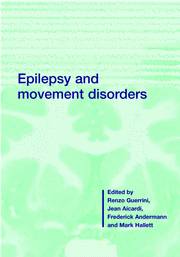Book contents
- Frontmatter
- Contents
- List of contributors
- Preface and overview
- 1 Epilepsies as channelopathies
- 2 Epilepsy and movement disorders in the GABAA receptor β3 subunit knockout mouse: model of Angelman syndrome
- 3 Genetic reflex epilepsy from chicken to man: relations between genetic reflex epilepsy and movement disorders
- 4 Functional MRI of the motor cortex
- 5 Neuromagnetic methods and transcranial magnetic stimulation for testing sensorimotor cortex excitability
- 6 Motor dysfunction resulting from epileptic activity involving the sensorimotor cortex
- 7 Nocturnal frontal lobe epilepsy
- 8 Motor cortex hyperexcitability in dystonia
- 9 The paroxysmal dyskinesias
- 10 Normal startle and startle-induced epileptic seizures
- 11 Hyperekplexia: genetics and culture-bound stimulus-induced disorders
- 12 Myoclonus and epilepsy
- 13 The spectrum of epilepsy and movement disorders in EPC
- 14 Seizures, myoclonus and cerebellar dysfunction in progressive myoclonus epilepsies
- 15 Opercular epilepsies with oromotor dysfunction
- 16 Facial seizures associated with brainstem and cerebellar lesions
- 17 Neonatal movement disorders: epileptic or non-epileptic
- 18 Epileptic and non-epileptic periodic motor phenomena in children with encephalopathy
- 19 Epileptic stereotypies in children
- 20 Non-epileptic paroxysmal eye movements
- 21 Shuddering and benign myoclonus of early infancy
- 22 Epilepsy and cerebral palsy
- 23 Sydenham chorea
- 24 Alternating hemiplegia of childhood
- 25 Motor attacks in Sturge–Weber syndrome
- 26 Syndromes with epilepsy and paroxysmal dyskinesia
- 27 Epilepsy genes: the search grows longer
- 28 Genetics of the overlap between epilepsy and movement disorders
- 29 Seizures and movement disorders precipitated by drugs
- 30 Steroid responsive motor disorders associated with epilepsy
- 31 Drugs for epilepsy and movement disorders
- Index
- Plate section
15 - Opercular epilepsies with oromotor dysfunction
Published online by Cambridge University Press: 03 May 2010
- Frontmatter
- Contents
- List of contributors
- Preface and overview
- 1 Epilepsies as channelopathies
- 2 Epilepsy and movement disorders in the GABAA receptor β3 subunit knockout mouse: model of Angelman syndrome
- 3 Genetic reflex epilepsy from chicken to man: relations between genetic reflex epilepsy and movement disorders
- 4 Functional MRI of the motor cortex
- 5 Neuromagnetic methods and transcranial magnetic stimulation for testing sensorimotor cortex excitability
- 6 Motor dysfunction resulting from epileptic activity involving the sensorimotor cortex
- 7 Nocturnal frontal lobe epilepsy
- 8 Motor cortex hyperexcitability in dystonia
- 9 The paroxysmal dyskinesias
- 10 Normal startle and startle-induced epileptic seizures
- 11 Hyperekplexia: genetics and culture-bound stimulus-induced disorders
- 12 Myoclonus and epilepsy
- 13 The spectrum of epilepsy and movement disorders in EPC
- 14 Seizures, myoclonus and cerebellar dysfunction in progressive myoclonus epilepsies
- 15 Opercular epilepsies with oromotor dysfunction
- 16 Facial seizures associated with brainstem and cerebellar lesions
- 17 Neonatal movement disorders: epileptic or non-epileptic
- 18 Epileptic and non-epileptic periodic motor phenomena in children with encephalopathy
- 19 Epileptic stereotypies in children
- 20 Non-epileptic paroxysmal eye movements
- 21 Shuddering and benign myoclonus of early infancy
- 22 Epilepsy and cerebral palsy
- 23 Sydenham chorea
- 24 Alternating hemiplegia of childhood
- 25 Motor attacks in Sturge–Weber syndrome
- 26 Syndromes with epilepsy and paroxysmal dyskinesia
- 27 Epilepsy genes: the search grows longer
- 28 Genetics of the overlap between epilepsy and movement disorders
- 29 Seizures and movement disorders precipitated by drugs
- 30 Steroid responsive motor disorders associated with epilepsy
- 31 Drugs for epilepsy and movement disorders
- Index
- Plate section
Summary
Introduction
The term operculum insulae denotes the cortical region that covers the insulae Reili. It is made up of frontal, parietal, and temporal cortical convolutions. A bilateral structural or functional disturbance of the cortical motor areas of the anterior part (frontal) operculum, including the inferior rolandic area, and their corticonuclear projections to the nuclei of the 5th, 7th, 9th, and 10th cranial nerves, causes a unique clinical picture of a supranuclear (pseudobulbar) palsy. It presents with swallowing difficulties, anarthria or severe dysarthria, and loss of the ability to imitate oral gestures, resulting from a central disturbance of volitional control of the facio-linguo-glosso-pharyngo-masticatory muscles, while preserving automatic, involuntary, emotional innervation, and reflex motor activity. Pathological crying and laughing are conspicuously absent. It is also designated Foix–Chavany–Marie Syndrome (FCMS), in honour of the authors who described it in 1926, in two adults with bilateral infarction of the anterior operculum (Foix et al., 1926). Bilateral cortical impairment underlies the symptomatology of FCMS as lower cranial nerve brainstem receive innervation from both hemispheres.
The best known form of the syndrome is the classical FCMS due to serial strokes in adults with cerebrovascular disease (Bruyn & Gathier, 1969). FCMS can also occur in infancy and childhood, in relation to diverse etiologies and different clinical evolutions. It can be permanent, secondary to congenital malformation or to acquired structural lesion in early life, or can have an intermittent or reversible expression in the background of certain epileptic disorders involving the perisylvian regions (Christen et al., 2000).
- Type
- Chapter
- Information
- Epilepsy and Movement Disorders , pp. 251 - 268Publisher: Cambridge University PressPrint publication year: 2001
- 3
- Cited by

